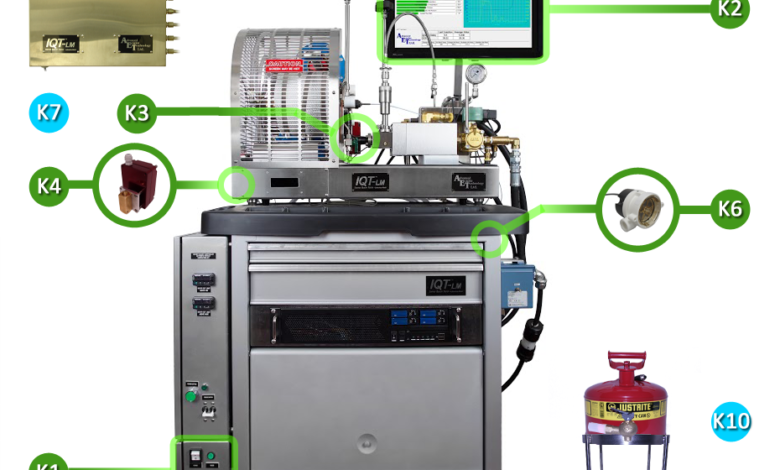
Introducing the IQT system, a game-changing CVCC instrument revolutionizing fuel testing since 1998. As the trusted referee test method in EN 15940, governing paraffinic fuels in Europe, the IQT system sets the standard for reliability, precision, and cost-efficiency. Its compact sample size, reduced combustion air requirements, and affordable reference materials make it the ultimate choice for fuel blending and groundbreaking research. With over 200 installations worldwide, some surpassing 100,000 test runs, the IQT system’s track record speaks volumes about its dependability.
Unveiling the IQT TALM Precision Package
Elevate your fuel testing to unprecedented heights with the IQT TALM Precision Package. This comprehensive package enhances the standard LM system with eight cutting-edge upgrade kits, ensuring maximum automation, precision, and user-friendliness.
TALM-K1: Elevating Control Cabinet
This control cabinet serves as the electronic interface for other automated components, making it indispensable for kits K3 to K6 and K10.
TALM-K2: IQT System and Control Software
Experience enhanced test monitoring with the IQT TALM software, providing high visibility and accessibility from any corner of your lab. Simplify calibration through automated, unattended mode testing, significantly boosting productivity and convenience.
TALM-K3: Nozzle Tip Temperature Control
Enhance IQT precision and eliminate manual coolant flow adjustments with this kit (requires TALM K1 and K2 kits).
TALM-K4: Combustion Chamber Tail Temperature Control
Achieve heightened IQT precision by eliminating the need for manual coolant flow adjustments in the combustion chamber tail (requires TALM-K1 and K2 kits).
TALM-K6: Electronic Coolant Flow Indicator
Bid farewell to manual coolant flow checks with Kit K6, providing automated digital coolant flow indication within IQT System Software (ISS) (requires TALM-K1 and K2 kits).
Discover More TALM Upgrade Kits
Explore additional TALM kits like TALM-K7 Electronic Pressure Regulator Panel, TALM-K8 Improved Heater Monitoring Tool (coming soon), TALM-K9 Self-Sealing Fuel Reservoirs with Filling Cleaning Station, and TALM-K10 Waste Fuel Container.
Key Features That Set IQT Apart
- ASTM D6890-18 extends the testing range (31.5 to 75.1 DCN) with enhanced precision.
- Sensitive to cetane improver additives and minor fuel quality variations.
- Measures high levels of cetane improver (3000 ppm+ 2EHN) without negative carryover effects.
- Ideal for testing highly paraffinic fuels from synthesis or hydro-treatment.
- Automated, quiet operation for ease of use.
- Short test time (under 20 minutes) ensures high productivity.
- Small sample size (less than 100 mL) reduces resource consumption.
- Rugged system with low operating and maintenance costs.
- Easy maintenance access.
- Proven safety track record over the years.
- Trusted for testing B100 and various biodiesel fuels from diverse sources.
FAQs about the IQT Totally Automated Laboratory Model
What is the IQT system, and why is it significant in fuel testing?
The IQT system is a cutting-edge CVCC instrument that has been at the forefront of fuel testing since 1998. It’s significant because it serves as the referee test method in EN 15940, governing paraffinic fuels in Europe, making it a proven, reliable, and precise instrument with low operating costs.
What are the key advantages of the IQT system?
The IQT system boasts advantages such as a small sample size, reduced specification combustion air, and cost-effective reference materials. It offers exceptional precision, making it a valuable tool for fuel blending and research purposes. With over 200 installations worldwide and a trusted track record, it’s a symbol of reliability.
What is the IQT TALM Precision Package, and how does it enhance the standard IQT system?
The IQT TALM Precision Package is a set of upgrade kits designed to elevate the automation, precision, and user-friendliness of the standard IQT system. It includes kits like TALM-K1 (System Control Cabinet), TALM-K2 (IQT System and Control Software), and more, all aimed at improving the overall testing experience.
Can I customize my IQT TALM Precision Package with specific upgrade kits?
Absolutely! The TALM Precision Package offers flexibility with eight available upgrade kits. You can choose the kits that best suit your needs, and if you prefer a comprehensive solution, you can opt for the TALM Precision Package, which bundles five primary TALM kits.
How does the TALM-K7 Electronic Pressure Regulator Panel benefit IQT operators?
The TALM-K7 panel enhances automation and precision by controlling all three gas stream pressures and monitoring gas levels in cylinders. It eliminates the need for manual gas pressure adjustments, ensures stable gas pressures, and alerts operators when gas cylinders are nearly empty to prevent test interruptions.
What are the key features that set the IQT system apart from other fuel testing instruments?
The IQT system stands out with its extended testing range (31.5 to 75.1 DCN), sensitivity to cetane improver additives, ability to measure high levels of cetane improver without carryover effects, suitability for testing highly paraffinic fuels, automation, quiet operation, short test times, small sample size, low operating costs, and a proven safety track record.
Can the IQT system test biodiesel fuels, and if so, from what sources?
Yes, the IQT system has a proven testing capability for B100 and various biodiesel fuels from different sources. It is versatile and adaptable for a wide range of fuel types.
How can I learn more about the IQT system and its capabilities for my specific needs?
To explore the IQT system’s capabilities and discuss how it can meet your specific requirements, please contact our team of experts who will be happy to provide you with detailed information and guidance.
Read tech related blog posts by visiting our website.

